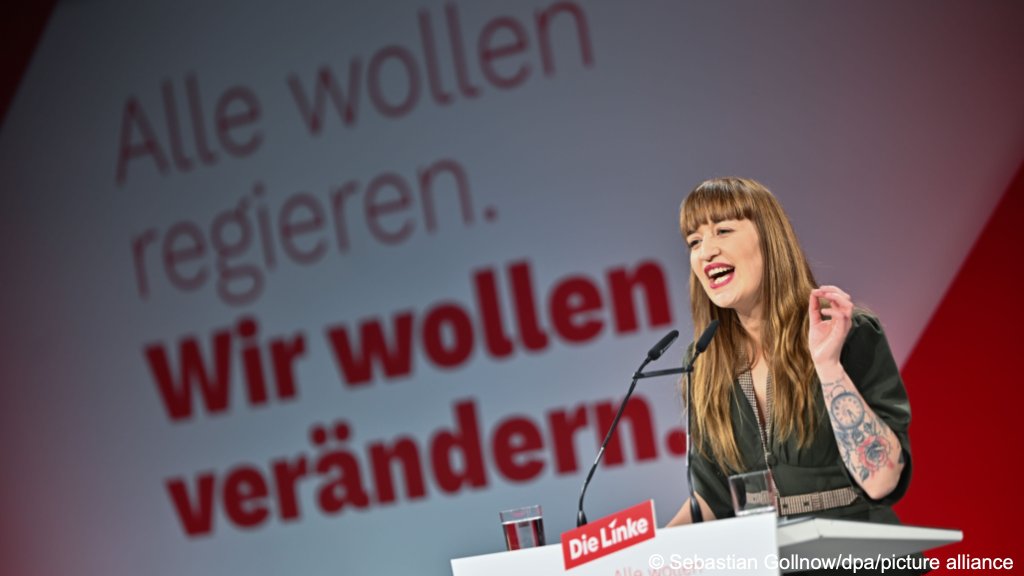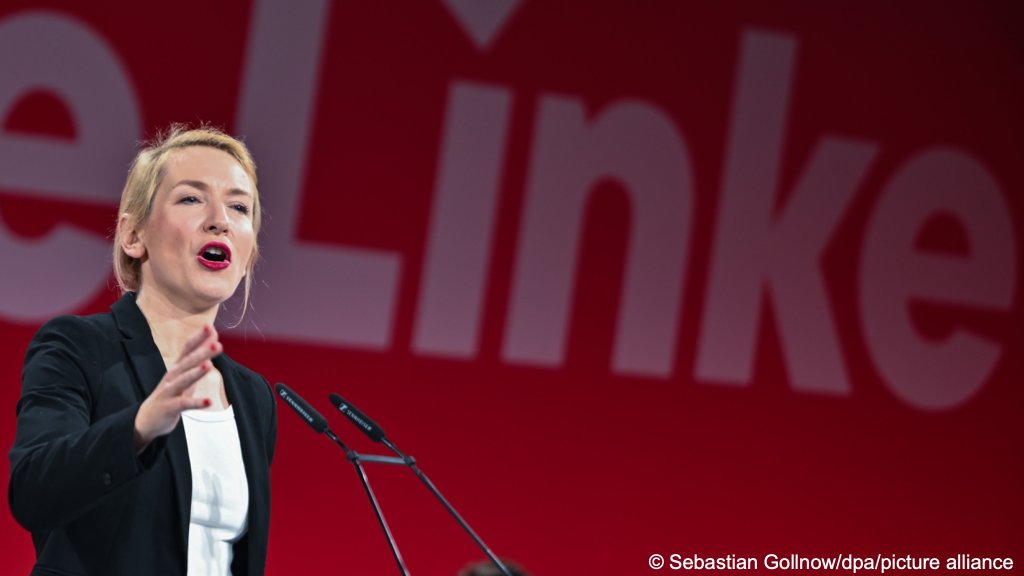With snap federal elections slated for February 23, InfoMigrants takes a look at the election manifestos of Germany's top seven political parties when it comes to migration. Today we look at the Left party, which demands an "open and solidarity-based immigration law".
For the 2025 federal elections, InfoMigrants takes a closer look at where The Left party and Germany's other top six political parties stand on migration and asylum policy: the Conservatives (CDU/CSU), the Social Democrats (SPD), the Greens, the Free Liberals (FDP), the Alternative for Germany (AfD) and the BSW.
Will The Left party clear the five percent threshold to enter Germany's Parliament?
The Left party (Die Linke) was founded in 2007. It emerged from the merger of the Party of Democratic Socialism (PDS) -- the successor party to the SED in East Germany -- and the Electoral Alternative for Labor and Social Justice (WASG) in West Germany. In its 17-year history, The Left party has never been part of a governing coalition, only at the state level.
The party has been in decline since 2010. Last year, a quarter of the faction's members of Parliament left the party to join the new BSW party, founded by the Left's former parliamentary group leader Sahra Wagenknecht. Few believed that the Left Party would have much success in the upcoming elections. However, recently The Left (Die Linke) has seen a momentum boost that led to a record number of members.
In addition to the hype around the party's top candidate Heidi Reichinnek, observers attribute The Left's new popularity to the party's self-professed anti-fascist stance, which seems attractive to voters amid Germany's political shift to the right. In late January, for instance, the conservative CDU/CSU candidate for Chancellor, Friedrich Merz, pushed through a controversial motion for a stricter migration policy with votes from the far-right AfD party.

Aside from its anti-fascist position, the democratic-socialist party advocates for a "different economic and social system" away from capitalism through "fundamental changes to the prevailing property, disposal and power relations".
In elections, the party advocates above all a comprehensive expansion of the welfare state and the ecological, resource-saving restructuring of the economy, which is to be financed by redistribution from the top to the bottom. In terms of foreign and security policy, The Left sees itself as a peace party that advocates consistent non-violence and disarmament.
When it comes to migration and asylum, The Left party's guiding principle is a "democratic and social immigration society that places human dignity at its center". The party's 60-page election manifesto can be divided into five categories:
1: Removing barriers to integration
- To further integration, The Left party wants to strip the Interior Ministry of its competence for migration and create a federal ministry for migration and participation.
- Instead of being guided by people's origin or "economic usability", Germany's immigration law should enable participation by involvement for all, for instance through an "extensive liberalization of visa policies".
- All those seeking protection are to be allowed to work from the day they arrive in Germany.
- A fund for so-called welcoming municipalities (Willkommenskommunen) that want to improve the conditions of a welcoming culture can request funding for the "care and participation" of migrants. Moreover, the federal government is to fully reimburse municipalities for accommodation costs migrants incur.
- Instead of initial reception centers, where asylum seekers are usually obliged to stay in until their asylum application has been decided, migrants and refugees are to be housed in apartments across the country; what's more, they are to be offered free language courses nationwide.

2: Equal rights and opportunities
- The Left party says it stands for an "immigration society" in which all people have the same "social, political and cultural" rights and opportunities "regardless of their passport, origin, skin color, cultural or religious affiliation."
- It wants to reform Germany's citizenship law more than the outgoing government coalition did: All children born in Germany are to automatically receive German citizenship. Anyone who's stayed in Germany for five years, moreover, should have a legal right to become naturalized, moreover, having lived in Germany should be sufficient to have lived in Germany for five years.
- Regardless of their citizenship, people who have lived in Germany for a long time should be able to vote here.
- The Left wants to introduce a participation law at the federal level ('Bundespartizipationsgesetz') to "better involve people with a migration history and represent them more in society".
- The law would entail a quota to raise the share of people with a migration history in public administration according to their share of the overall population; and a participation council (Partizipationsrat) that would include migrant self-organizations and would be consulted for "important decisions" concerning the economy, science and politics.
- When it comes to government subsidies, The Left party rejects "discriminating" in-kind services and payment cards, preferring "regular cash payments at the level of the solidarity-based minimum income for all people."
3: EU – abolishing Frontex, pushbacks, migration agreements
- The Left party wants to replace the European Union's border and coast agency Frontex with a civil society-led European sea rescue program that is to be aided by "existing surveillance instruments" in the Mediterranean and the EU's external borders; the party also demands an end to what it calls a "criminalization of the civil society sea rescue".
- At the EU's external borders, The Left is in favor of guaranteeing "individual access" to asylum procedures and legal protection for asylum seekers. It also rejects both illegal pushbacks and the tightening of asylum policies, such as proposals to detain migrants and process their asylum applications in countries outside of the EU.
- It also rejects the EU Asylum and Migration Pact and the bloc's controversial migration agreements -- designed to stop migrants from reaching the EU -- with countries of origin and transit countries such as Tunisia and Egypt.
- The Left emphasizes that access to asylum is a human right and that asylum procedures need to take place directly at the EU's external borders.
- Overall, it deems "systematic border controls" and rejecting protection seekers the EU's internal borders "inadmissible".
- The Left is hedging their bets on safe and legal immigration pathways to the EU, first and foremost through UNHCR's resettlement program, which the party says needs "comprehensive admission quotas".
- Countries, regions and cities ready to "adequately" take in and care for more migrants and refugees are to receive EU funds.
4: Germany: No to deportations, racism
- The Left party rejects deportations, even of criminals, "especially to war, persecution and misery or as a form of double punishment."
- The party advocates for providing offenders with regular criminal proceedings in Germany irrespective of their residence status; if necessary, they are to serve prison sentences in Germany.
- It also demands legalization options for people without residence status and effective right of residence regulations for people who have to live with an insecure residence status or with so-called Kettenduldungen (repeatedly extending temporary suspensions of deportations), which are widely considered a barrier to integration.
- The Left wants to expand Germany's efforts to tackle racism beyond the work of the existing federal anti-racism, the anti-discrimination and the antisemitism commissioners: Among other things, it calls for a "clear working definition" of institutional and structural racism, reforming the General Equal Treatment Act (Allgemeines Gleichbehandlungsgesetz), abolishing the controversial practice of police controls based on racist criteria ('racial profiling') as well as measures against anti-Muslim racism and a 'commissioner for Muslim life'.
- The Democracy Support Act (Demokratiefördergesetz), a draft bill that the outgoing government agreed on in 2022 but was never ratified by Parliament, is to "strengthen and permanently promote" civil society groups including conducting pro-democracy and anti-racism groups, refugee councils and migrant associations.
- In Germany, The Left wants "independent asylum procedure counseling" by welfare organizations and associations.
5: Expanding the recognition of reasons for fleeing
- The Left party wants to fundamentally change the way Germany and the EU treat people fleeing conflict, persecution and (economic) hardship.
- Persecution on the grounds of sexual orientation and of "trans and intersex people" must be recognized in practice as a reason for fleeing, the party demands.
- It also calls for not only a recognition of climate and environmental damages and poverty as reasons for fleeing, but also a "corresponding humanitarian visa issuance".
- Moreover, migration due to social and economic reasons should be considered a "legitimate individual need".
